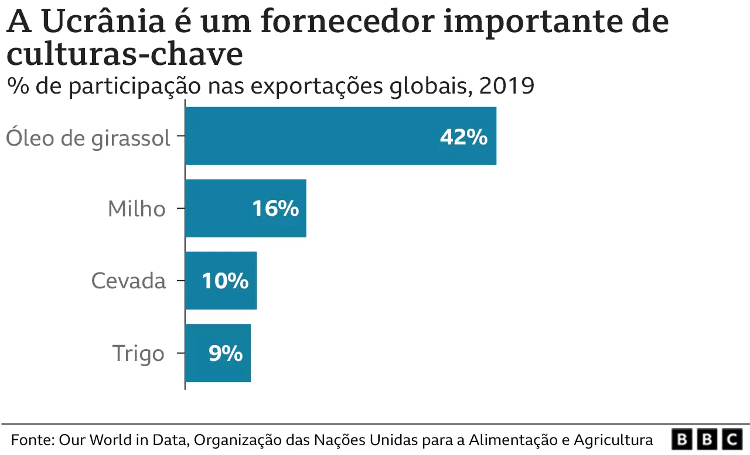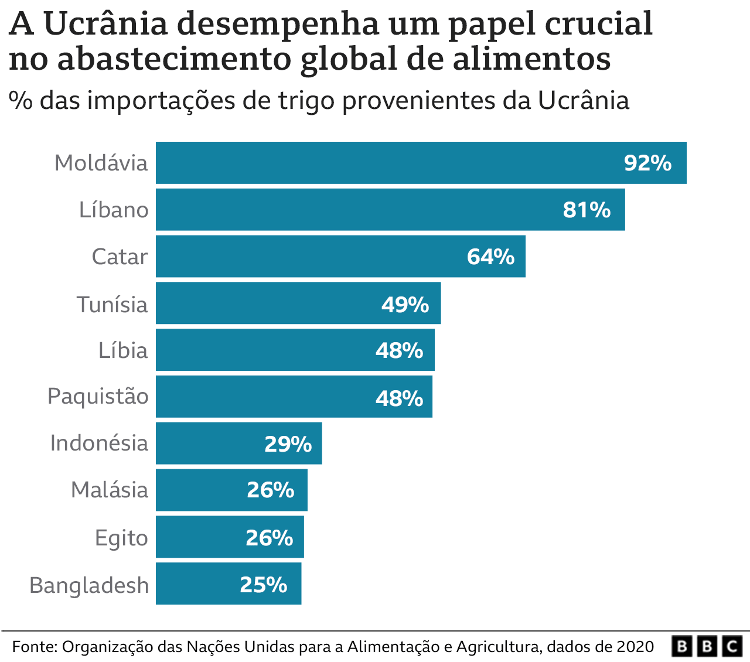Russia and Ukraine, mediated by Turkey and the United Nations (UN), reached an agreement to reopen Ukrainian ports in the Black Sea and allow grain to be transported to the rest of the world.
Negotiations took two months and included the liberalization of Russia’s grain and fertilizer exports – Brazil imports 85% of the input and Russia accounts for 23% of these imports.
- War in Ukraine: Russia’s new plans to escalate the conflict
The Russian government’s blockade of the operation of Ukrainian ports during the occupation at Moscow’s behest caused food prices to soar worldwide.
Products began to run out of shelves, especially in poor countries.
How big is the cargo held in Ukraine today?
About 20 million tons of grain are kept for export in the country.
Ukrainian President Volodymyr Zelensky said the amount could rise to 75 million tons after this year’s harvest is complete.
The ongoing war will also lead to a decline in the Ukrainian crop.
About 30% of the 86 million tons of grain Ukraine normally produces will go unharvested, says Laura Wellesley, a food safety expert at the Chatham House international relations think tank.
The main importers of Ukrainian grain are developing countries: Egypt with 3.62 million tons in 2021, followed by Indonesia, Bangladesh, Turkey and Yemen.
How did the grain shortage affect other countries?
Ukraine is the world’s fourth largest grain exporter. The world produces 42% of sunflower oil, 16% of corn and 9% of wheat.
In addition, wheat shipments from Russia, the world’s largest exporter, also decreased.
- How the war in Ukraine makes the future of tanks uncertain
The sanctions imposed by the Western powers do not specifically target Russian agriculture – Russian ships carrying agricultural products are not prohibited from entering European Union ports.
But the Kremlin argues that they are hurting exports by increasing insurance rates and barriers to payments.
The African Development Bank says Ukraine and Russia provide more than 40% of African wheat.
But the war was responsible for the 30 million tons of food shortages on the continent. This contributed to a 40% increase in food prices.
In Nigeria, the increase in products such as brandy and bread reached 50%.
Faced with a humanitarian crisis, Yemen typically imports more than 1 million tons of wheat annually from Ukraine.
- The drama of Ukrainian parents rescuing their adopted child from a city destroyed by Russia
The UN says that the decrease in the supply of raw materials between January and May increased the price of flour by 42% and the price of bread by 25% in Yemen.
Bread price doubled in Syria, another important wheat importer of Ukraine.
After the news of the agreement, international wheat prices decreased.
However, Laura Wellesley said that grain shipments from Ukrainian ports should be important to alleviate the plight of many Middle Eastern and African countries.
“This will further increase the price of bread in these countries, which will cause a lot of social unrest,” he says.
How does the unlock plan work?
Turkey, together with the UN, negotiated an agreement with Russia and Ukraine to open a “sea corridor” in the Black Sea. The plan provides:
- Ukrainian ships will guide grain-carrying vessels to avoid sea areas containing explosive mines;
- Russia establishes a ceasefire for shipments;
- Turkey inspects ships to allay Russian fears of arms smuggling;
- Russia is allowed to export grain and fertilizer to the Black Sea.
Who will insure the cargo ships using the sea corridor?
The cost of such insurance rose after the Russian invasion of Ukraine.
According to David Osler of Lloyds List, some companies charge 5% or 10% of the value of the ship for a single Black Sea voyage.
Insurance costs may decrease if Ukraine accompanies ships in mined areas.
“I don’t think they’re going to stop transporting grain from Ukraine to where it’s needed,” says Osler.
How was grain exported without a secure sea corridor?
Before the war, Ukraine shipped over 90% of its food exports by sea.
With the ports blocked, the country is trying to export as much as possible by land, using trucks and trains.
The European Union has established “solidarity paths” so that Ukraine’s grain can be shipped from ports in the Baltic Sea and Romania.
But a big problem is that Ukraine’s train tracks are wider than the rest of Europe. This means that grains will be unloaded from one set of wagons at the border and reloaded into others.
It takes up to three weeks for the grains to cross Europe and reach the Baltic ports.
The Grain Society of Ukraine says that only 1.5 million tons of grain are exported per month – up to 7 million tons before the war.
– Text originally published at http://bbc.co.uk/portuguese/internacional-62272076
Did you know that the BBC is also on Telegram? subscribe to the channel.
Have you watched our new videos on YouTube?? Subscribe to our channel!
source: Noticias
[author_name]


